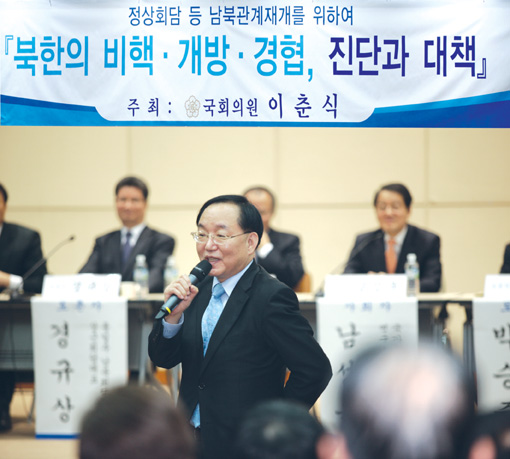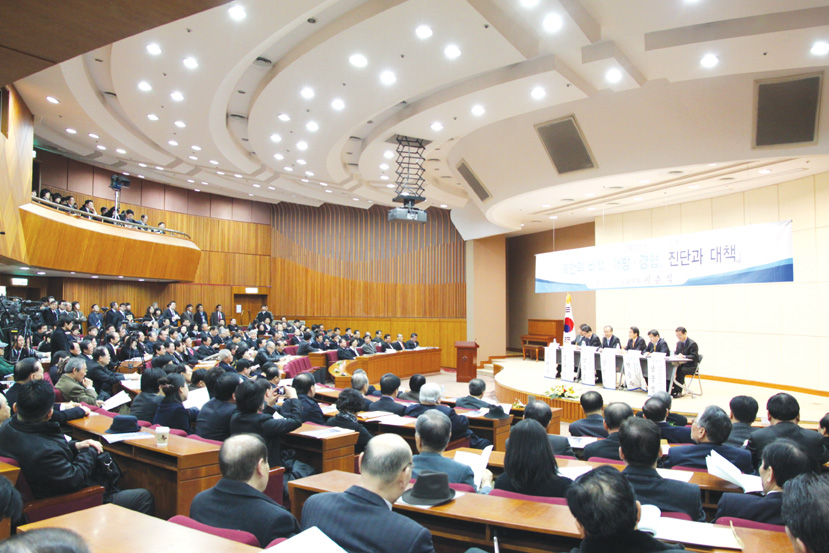'Diagnosis and Prescription for North Korea'
North Korea experts under the current government attend a policy discussion session

Authorities on North Korea under the Lee Myung-bak government gathered at a policy discussion seminar on North Korean nuclear arms ambitions, market-opening and inter-Korean economic cooperation, organized by Rep. Lee Chun-sik, a member of the National Assembly Foreign Affairs, Trade and Unification Committee on Feb. 23 at the National Assembly Building.
The chair of the seminar was Nam Sang-wook, president of the Institute for National Security Strategy, and Prof. Nam Ju-hong, of Kyonggi University and concurrently an ambassador-at-large for international security at the Ministry of Foreign Affairs and Trade. The two were considered to be among the architects of the current government's North Korea policies. Kyung Kyu-sang, standing representative for inter-Korean dialogue at the Special Office for Inter-Korean Dialogue, and Kim Tae-woo, fellow at the Korea Institute for Defense Analysis, also spoke at the gathering.
In his presentation, titled "North Korean nuclear crisis and inter-Korean ties at a crossroads: Diagnosis and Prescription," Nam said, "There should be a division between unification policies and security-related policies in managing inter-Korean relationships facing a crossroads, and the former has to be approached in a practical and humanitarian perspective and according to principles of separating politics and economy while the latter must be done based on principles of reciprocity and linkage between politics and economy to preempt confusion." In a word, he said, South Korea should pursue a balance between policies designed to consider North Korea as the same people and provide humanitarian support and ones to hold in check the North's armament ambitions and warnings against an armed unification offensive.
He noted that the brisker the dialogue and the more diversified the exchanges and other forms of cooperation, the more trials and errors and incidents will take place. In a situation where a confidence-building structure has not yet been built, chances are high that more contacts and exchanges could cause misunderstanding and misjudgment over the adjustment of the pace of changes, as evidenced by the North Korean military's killing of a South Korean tourist on Mt. Geumgang and the holding of a South Korean official of the Gaeseong Industrial Complex hostage.
In this regard, he said, if ups and downs in the unstable inter-Korean ties are somewhat controlled by both sides, both Koreas will face a watershed in inter-Korean relationships.
"Now is the time, as we will have to make the year 2010 the first year of taking the initiative in inter-Korean ties, and as a result, if the South establishes a new paradigm as the chair of the G-20 Summit and pursues inter-Korean talks, we can lead in setting a milestone in a unification process that could lead from a stage of division to a stage of integrated management via crisis management," Nam said.

Park Seung-joon, director of the Chosun Ilbo North Korea-China Strategy Research Institute, said it was first time that North Korean leader Kim Jong-il or his predecessor Kim Il-sung met a Chinese envoy carrying an official message from China's top leader at a place other than Pyongyang, as Kim Jong-il recently received Chinese Community Party International Affairs Chief Wang Zairu, and it could be seen as a demonstration of the North's own free maneuvering toward China in handling the North Korean nuclear issue, South Korea strategies and its ties with the United States.
Making observations of the situation on the Korean Peninsula, focusing too much on Kim Jong-il's faltering health, his heir-apparent and several other abnormal issues and concluding that there will be an imminent collapse of the North is too hasty, Park said. He added that South Korea needs to establish "sustainable" strategies on unification and external relations to brace for a brisker rapport between the North and China and North Korean-U.S. ties that could lead to a faster pace of amicable ties.
Rep. Chung Mong-joon, chairman of the Grand National Party, aid in his opening speech that North Korea's possessing nuclear arms would make it difficult to realize peaceful reunification.
Rep. Lee said in his speech, "South Korea needs to have a principle of solving inter-Korean issues on our own as one people, and in particular, all inter-Korean issues, including inter-Korean economic cooperation, should be handled through mutual respect and sincere dialogue while pursuing the denuclearization of the North." He emphasized that the South should maintain unified policies toward the North and strive to put inter-Korean relations on the right track despite the North's unwavering hawkish and hard-line attitudes. He added that this forum was designed to explore a possible inter-Korean summit and other ways for the Lee Myung-bak government to implement policies to pursue the denuclearization of North Korea, market-opening and inter-Korean economic cooperation.
Prof. Namgung Young of Korea University of Foreign Studies said the South should strengthen policy capabilities through diplomacy with allies, the United Nations and its neighboring countries so that the North's nuclear threats and the use of nuclear arms should not be allowed. And with the South's limited leverage over North Korea, it needs to promote collaboration with the international community and step up cooperation with the United States. He noted that the Stalinist state faces a regime dilemma in which it cannot give up its nuclear arms ambitions despite the international community's efforts to solve the issue.
Also those on hand at the discussion were Rep. Lee Sang-deuk, former speaker of the National Assembly, Rep. Park Jin, chairman of the National Assembly Foreign Affairs, Trade and Unification Committee, Rep. An Kyung-ryul, former secretary general of the GNP, and Rep. Hwang Jin-ha, chairman of the GNP Second Policy Coordination Committee. nw
Rep. Lee Chun-sik, a member of the National Assembly Foreign Affairs, Trade and Unification Committee, gives a speech at a policy discussion seminar on North Korean nuclear arms ambitions, market-opening and inter-Korean economic cooperation, organized by on Feb. 23 at the National Assembly Building.
The policy discussion seminar on North Korea brings together North Korea experts under the
Lee Myung-bak government.
3Fl, 292-47, Shindang 6-dong, Chung-gu, Seoul, Korea 100-456
Tel : 82-2-2235-6114 / Fax : 82-2-2235-0799